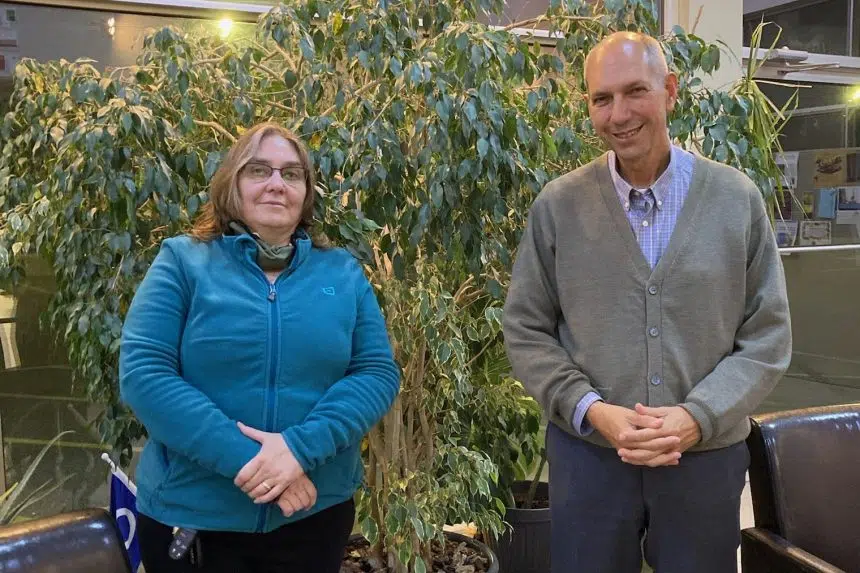Earlier this month, a report revealed more than 200,000 children have been victims of abuse at the hands of the French Catholic Church.
But local dioceses are saying the legacy of abuse exists in Saskatchewan, too.
Pam Walsh is a victim of clergy sexual abuse. She says it began in the 1960s, when she was a child, and continued for years. It happened in the home of a relative who was friends with a local priest and visited them frequently.
Walsh was also at the home regularly because of a tumultuous home life. Her relative was trying to give her some stability at their home.
She said she doesn’t like to talk about the abuse she endured.
“I don’t get into the details of it because it’s pretty horrific. It’s very shocking for people and very hard to talk about, but it has left dramatic scars on my life.” Walsh said.
“I don’t know what I was meant to be and the generational impact of it is astronomical even though some people didn’t even know about it.”
Walsh wasn’t Catholic when she was experiencing her abuse, but her family was very religious and never knew what Walsh was experiencing. She grew up, entered the church, was married and had children, but her trauma remained with her throughout.
“I would shake uncontrollably around the priest. So there was something there because the abuse was so horrific, it’s scary,” Walsh recalled.
A journey to heal
In 2005, Walsh disclosed for the first time that her abuse had occurred while discussing another matter.
The response she received brought her trauma crashing down on her again. Walsh was told the Catholic church could not and would not help her, and she was told she needed to leave the church immediately.
“And the church door was locked behind me,” Walsh said. “That door still echoes in my ears.”
She also tried to work with the Archdiocese of Regina’s former archbishop, which she said didn’t go well. Then, about five years ago, Archbishop Donald Bolen arrived at the Archdiocese.
After setting up a meeting with him, Walsh asked Bolen if he would walk with her through her trauma and he agreed.
It wasn’t an easy process, Walsh recalled, but said she began to find healing from her abuse when Bolen began to work through it alongside her.
“He began to see the pain,” she said.
Bolen began working with other victims of church abuse soon after arriving at the Archdiocese. He said it’s been important for healing within the church to listen to victims and make changes they suggest.
Walsh’s case was deemed credible but still hasn’t been fully resolved because of complicating factors.
Addressing abuse in Saskatchewan
It was through meeting with victims of abuse that Bolen said he “became aware of the extent of the legacy of sexual abuse here.”
It’s why Bolen sees a greater need to address abuse here in Saskatchewan than focusing on the abuse in France, though he called the report on the French Catholic Church “horrific.”
“My reaction is also shaped by the reality that we have a legacy of clergy sexual abuse here,” Bolen explained. “Our real responsibility is to focus on that legacy here and to work with victims here and to do everything we can to make our churches safe for vulnerable people here and now.”
Rather than pointing fingers, Bolen said he wants to focus closer to home and continue to help shoulder the “heavy burden that victims carry.”
Likewise, Roman Catholic Bishop Mark Hagemoen of the Diocese of Saskatoon said the highlights of the report on the French church address a number of issues that Catholic assemblies in Canada have been looking at for some time.
Hagemoen said the Diocese of Saskatoon has also been grappling with abuse in its history.
He said it was “terrible to hear that kind of news over that period of time about the issue of abuse of children and youth,” and it surprised him “a little” that it took this long for “that particular ecclesiastical assembly in France to be done and released.”
Changes in the church
Today, Walsh does not believe in God or the Catholic church.
“It has destroyed me and revictimized me,” Walsh said. “That’s all gone.”
The impact of abuse on Walsh’s life has been huge, but it hasn’t kept her from wanting to try and support other victims in their search for healing. She now works with Bolen to help the church do better in its journey towards addressing its mistakes.
To chart a new path for the church going forward, Bolen and Hagemoen have both been implementing changes in Regina and Saskatoon parishes.
“We’ve put a lot of work into not only mitigating any sort of culture of sexual abuse — in any context, including in the church — but looking at the big picture of outreach and healing and how to deal with the process of reporting allegations,” Hagemoen explained.
In March 2020, the Diocese of Saskatoon announced it would be releasing and implementing a Safeguarding Action Plan to focus on implementing a safer church culture.
Practically, that looks like a day-by-day commitment to support and listen to victims and complainants when they come forward with reports of abuse at the hands of the church. Hagemoen said the church has arranged for contact people — independent of the church — to help hear, process and investigate each report of abuse and ensure victims are supported every step of the way.
He said it’s also important to make sure people who work and volunteer in churches are aware of these things.
“One example of abuse in a church setting is one too many,” Hagemoen said.
“I, for one, don’t want to see that. We don’t live in a perfect world but we certainly live in a world where, as a church organization, we’re doing all we can to move into a culture of safety and health for everyone. That’s our commitment and we’re striving to live it.”
Hagemoen has also apologized publicly to victims of abuse in Saskatoon.
“To any person in our diocese or beyond who has experienced abuse by clergy or anyone else in the church, for that matter, I, as the bishop of this diocese, express profound sorrow and I apologize for what you have suffered and for any betrayal, violation or abandonment that people may have experienced,” he said.
“I want to express very strongly and apologize to all of our church and faithful beyond who may or may not be a member of the Catholic church, whose faith and trust may have been damaged because of the sinful actions of those who, in the past, have abused the innocent, and those included who may have covered up any abuse.”
He continued, acknowledging that both individual and institutional change must happen in the church for it to move forward, and acknowledging its earnest commitment to continuing to work on its action plan.
In Regina, the group of victims that meets has arranged and written prayer services with the intent of making parishes and congregants aware that victims are among them.
Bolen said the Regina Archdiocese has worked on offering educational workshops for people to learn more about the church’s history with abuse. Bolen himself has also written three public letters to victims of clergy abuse to apologize and encourage other victims to come forward.
Policies within the Archdiocese of Regina have also been revised, Bolen said, to more directly relate to victims and advise on where they can report abuse. A counsellor for victims of abuse has also been hired, in addition to the role Walsh fulfils in victim services advocacy, where she supports victims and works with them and the church to educate people about abuse, teach about triggers and how to look for grooming behaviours.
“A lot of people think it’s very odd that somebody no longer believes in God or the Catholic church and basically has been kicked out is actually calling to account through a process of working with them,” Walsh said.
“I know the impact on the lives that will have happened. Although some of our abuses will be different, we deal with a lot of the same issues.”
Walsh has been to nearly every prayer service put together by fellow abuse victims.
“That’s extremely, incredibly difficult to put part of your life on display,” she said, adding the powerful services often bring forward yet another victim or family member of a victim to share their story of abuse.
“You start to see people change their thought process and begin to understand that we need to work with — rather than point fingers and blame — and we need to believe … abuse of power can’t be allowed to happen anymore. So it’s about trying to make things safer.”
Bolen said victims hold the key to how the church needs to change, and are showing the church a path.
“(They’re) also such sources of wisdom and resilience.”
An ongoing journey
Walsh said every relationship she’s ever had has been tainted by the abuse.
“I can’t get that back. It leaves me with a lot of scars and a lot of pain. I’m a deeply wounded person and I can either be bitter about that or I can try and use it in a different way. And that’s what I’m trying to do right now so it never happens to another child.”
While she has to live with her past, Walsh believes she can help work to change the future for others.
She said it’s “terribly difficult” to see the extent of abuse and work through it with victims, but it’s progress.
She was horrified to hear the numbers coming out of the French Catholic Church report, but wasn’t surprised.
“One of the reasons this has been hidden for so long is because victims have been silent,” she explained. “When these numbers come out, victims can start to talk about it, start the conversation. They might still never come forward, but they might tell somebody. And that still is allowing them to move forward a little bit.”
It’s time for change to come, Walsh said — to stop putting priests on pedestals and start doing work to help those abused and prevent abuse in the future.
“We ask to be walked with and not condemned, not pushed aside,” she said.
“This is part of our legacy and there’s a need to be accountable,” Bolen said. “So much of clergy sexual abuse deals with the abuse of power so asking, calling on clergy and all who exercise leadership in the church today to exercise power in such a way that it is service, that it is protecting the vulnerable.
“Power from the perspective of Jesus … that was about service.”







